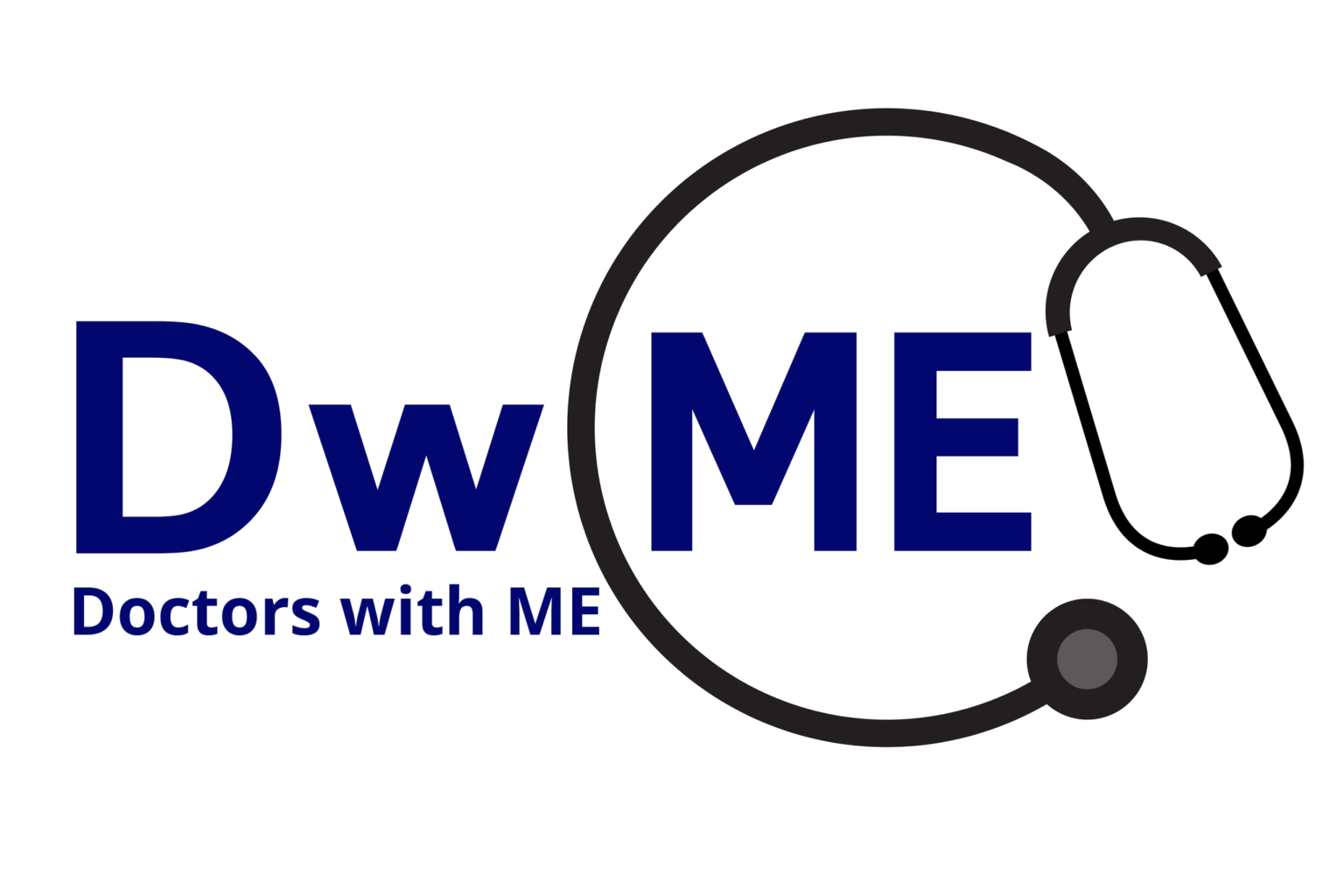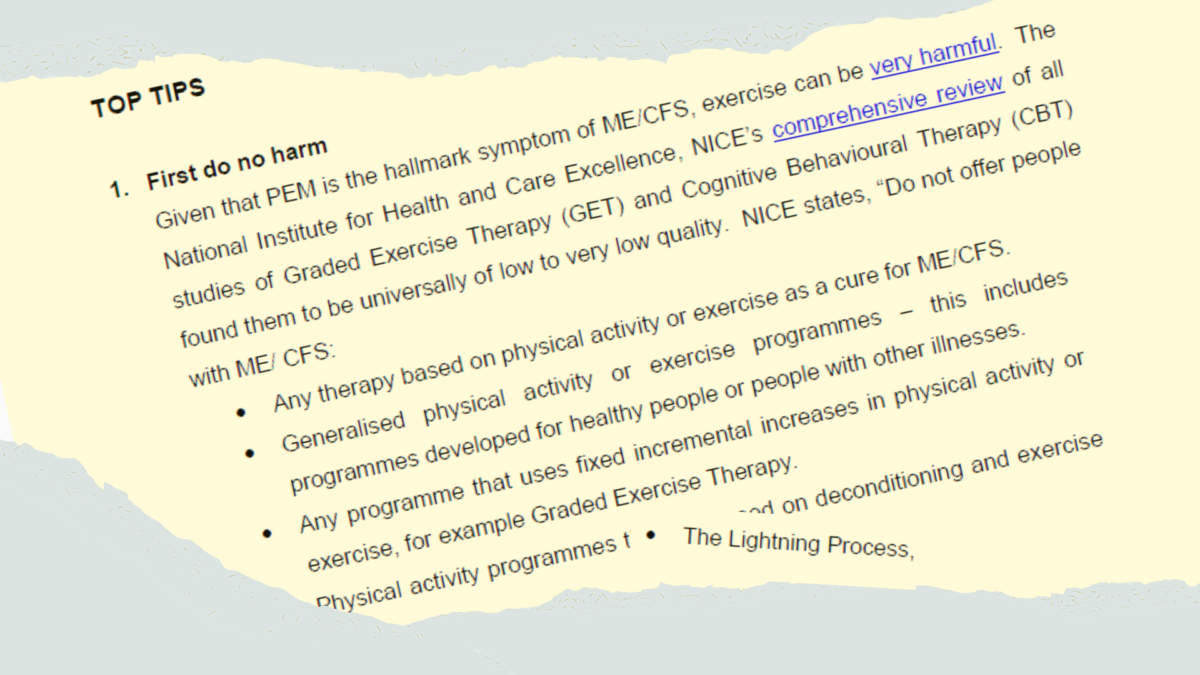Medical Education Working Group
DIAGNOSIS AND SYMPTOMS
ME/CFS is…
A chronic, complex, multi-system biological illness with often devastating consequences. It affects all age groups including children and all socioeconomic groups. About 75% of sufferers are female. It can affect all aspects of life for people with ME/CFS as well as their families and carers, and has a worse quality of life score than many other serious illnesses such as Cancer, Stroke, Rheumatoid Arthritis and Multiple Sclerosis.
ME/CFS is not…
“Functional” or psychosomatic. It is not anxiety or depression, Medically Unexplained Symptoms (MUS), Perplexing/Persistent Physical Symptoms (PPS), Functional Neurological Disorder (FND), Pervasive Refusal Syndrome (PRS), Fabricated or Induced Illness (FII), eating disorder or any other psychological labels.
Differentiating ME/CFS from Psychiatric Disorders by Dr. Eleanor Stein
Post Exertional Malaise (PEM) / PESE
The cardinal symptom of ME/CFS is Post Exertional Malaise (PEM) / Post Exertional Symptom Exacerbation (PESE). This is the exacerbation of illness that results when a patient’s energy limit is exceeded. Depending on illness severity, it can be triggered by very minor exertion, which can be mental, physical, sensory, orthostatic, social or emotional. The resulting “crash” can be delayed by up to 72 hours, is protracted (lasting days, weeks, months or more) and out of proportion to the trigger. PEM results in marked reduction in activity compared to pre-illness levels. It is an essential criterion in the diagnosis of ME/CFS.
Other symptoms of ME/CFS
The other main symptoms of ME/CFS are:
- Debilitating fatigue that is worsened by activity, is not caused by excessive cognitive, physical, emotional or social exertion, and is not significantly relieved by rest.
- Unrefreshing sleep or sleep disturbance.
- Cognitive difficulties or ‘brain fog’ (when compared to usual function).
The following associated symptoms can also be present:
- Orthostatic intolerance, autonomic dysfunction, dizziness, palpitations, fainting, nausea on standing or sitting upright from a reclining position.
- Temperature hypersensitivity resulting in profuse sweating, chills, hot flushes or feeling very cold.
- Neuromuscular symptoms, including twitching and myoclonic jerks.
- Flu-like symptoms, including sore throat, tender glands, nausea, chills or muscle aches.
- Intolerance to alcohol, or to certain foods and chemicals.
- Heightened sensory sensitivities, including to light, sound, touch, taste and smell.
- Pain, including pain on touch, myalgia, headaches, eye pain, abdominal pain or joint pain without acute redness, swelling or effusion.
How to diagnose ME/CFS
ME/CFS should be suspected when the four main symptoms have been present for six weeks in adults or four weeks in children. Perform a thorough workup to rule out other potential causes. If no other causes are found and symptoms are still present after 3 months, ME/ CFS can be confirmed. (NICE 2021)
The IOM diagnostic criteria and International Consensus Primer are also in use. All of these diagnostic criteria require PEM as an essential feature for diagnosis to be made. Older diagnostic criteria such as the Oxford and Fukuda criteria, which do not require PEM as an essential feature, are incorrect and should not be used.
TOP TIPS
1. First do no harm
Given that PEM is the hallmark symptom of ME/CFS, exercise can be very harmful. The National Institute for Health and Care Excellence, NICE’s comprehensive review of all studies of Graded Exercise Therapy (GET) and Cognitive Behavioural Therapy (CBT) found them to be universally of low to very low quality. NICE states, “Do not offer people with ME/ CFS:
- Any therapy based on physical activity or exercise as a cure for ME/CFS.
- Generalised physical activity or exercise programmes – this includes programmes developed for healthy people or people with other illnesses.
- Any programme that uses fixed incremental increases in physical activity or exercise, for example Graded Exercise Therapy.
- Physical activity programmes that are based on deconditioning and exercise avoidance theories as perpetuating ME/CFS.
- The Lightning Process, or therapies based on it.”
CBT can at best provide psychological support and at worst contribute to harm by consuming precious energy or misinforming patients. It is not a cure and NICE states that practitioners must not assume people have abnormal illness beliefs and behaviours as an underlying cause of their ME/CFS.
2. Learn about ME/CFS
Learn about the many symptoms of ME/CFS, how you may help with them, and the common comorbidities that can be present, which should be treated in their own right.
NICE guideline 2021 | US Consensus Recommendations | Bateman Horne Center | Dialogues project | Dysautonomia International | POTS UK
3. Teach patients to pace
There is no cure for ME/CFS. The most important aspect of management is to learn to manage activities to stay within the individual’s energy limit and avoid triggering Post Exertional Malaise. Advise patients to rest and pace as soon as the diagnosis is suspected. An occupational therapist who understands ME/CFS can be invaluable in teaching pacing techniques and providing aids and adaptations that help conserve energy.
4. Provide symptomatic treatment
Compassionate care can make a huge difference to the patient experience. Attend to issues such as sleep disturbance, orthostatic intolerance and pain in order to improve function and quality of life. Be creative and committed, but be cautious. When prescribing medications, start low and go slow as ME/CFS patients are more susceptible to side effects. Beware of inflexible sleep hygiene interventions as they are not appropriate in ME/CFS and have been known to cause significant harm.
5. Arrange nutritional support
Severely ill ME/CFS patients can struggle to maintain their nutrition due to muscle weak-ness / paralysis, difficulty swallowing, nausea / abdominal pain, dysautonomia of the GI tract, food intolerances and Mast Cell Activation Syndrome. Screen for undiagnosed gastrointestinal disorders, such as Coeliac disease. Nutritional failure can cause death in ME/CFS and some patients need enteral or intravenous tube feeding. Refer early for nutritional assessment and support.
6. Minimise the impact of care
Care must be taken to respect patients’ sensory limitations and allergies as this can also trigger PEM. Those very severely affected and bed bound can be extremely sensitive even to the lightest touch, lowest light and softest whispers, so care must be given with the greatest of caution. Environmental factors such as noise, light and smells are also important considerations when ME/CFS patients require hospital admission or need to attend other healthcare settings, such as radiology departments.
7. Protect from Safeguarding misadventures
Poor clinical understanding of ME/CFS has meant that patients have been accused of malingering or admitted to psychiatric hospitals, and the families of children with ME/CFS have frequently been suspected of fabricating or enabling their child’s illness. Where abuse or neglect is suspected, a knowledgeable ME/CFS specialist must be consulted. NICE helpfully lists features commonly seen in ME/CFS which do not necessarily mean a patient is being abused or neglected:
- Physical symptoms that do not fit a commonly recognised illness pattern.
- More than one child or family member having ME/CFS.
- Disagreeing with, declining or withdrawing from any part of their care and support plan, either by them or by their parents or carers on their behalf.
- Parents or carers acting as advocates and communicating on their behalf.
- Reduced or non-attendance at school.
Tymes Trust paper | Action for ME survey | Voices film | British Association of Social Workers (BASW) guidance on FII
8. Support applications for financial support and social care
Only a minority of ME/CFS patients are able to work and most of these can only manage reduced hours. Social and other activities are sacrificed to sustain the energy required for work. Access to any support to which patients are entitled is therefore crucial.
9. Support accommodations at work and in education
Reasonable adjustments should be provided to enable ME/CFS patients to remain in employment or education. Accommodations can include modifications to the work envi-ronment, reclining work stations, rest facilities, shorter working hours, working from home and transport or parking arrangements. In the UK patients may be entitled to assistance via the Access to Work scheme.
For children and young people, consider education at home where needed using online resources and communication tools, home tutoring and flexible or hybrid arrangements, to provide equal access to education as much as is possible. ME/CFS is the single greatest cause of long-term sickness absence in UK schools, therefore solutions must be found to minimise the impact of this disease on the educational attainment of affected children and young people.
10. Provide high quality medical care
ME/CFS services should include medically trained Physicians, GPs / family doctors or Paediatricians, who can provide comprehensive assessment, appropriate investigations and make diagnoses (NICE, Box 3, pg. 16). Services should have access to allied health care professionals such as nurses, occupational therapists and dietitians, who can assess, treat and perform procedures in patients’ homes where necessary. A named contact should be provided so that patients know how to get help when needed.
11. Be accessible
Services should be accessible. 25% of ME/CFS patients are house bound or bed bound, and those who can get to a doctor’s surgery often suffer Post Exertional Malaise as a result. Therefore these patients require telephone or video consultations and home visits. For this reason services should ideally be community based.
12. Review patients regularly
It is easy to forget patients who are bed bound and too weak to seek medical care. ME/CFS patients should be regularly reviewed – annually for adults, six-monthly for children (NICE 2021). Evaluate and investigate new symptoms and changes in symptoms to determine if they are due to ME/CFS or to another condition. Do not forget routine primary prevention (e.g. well woman checks, smear tests) and vaccinations.

